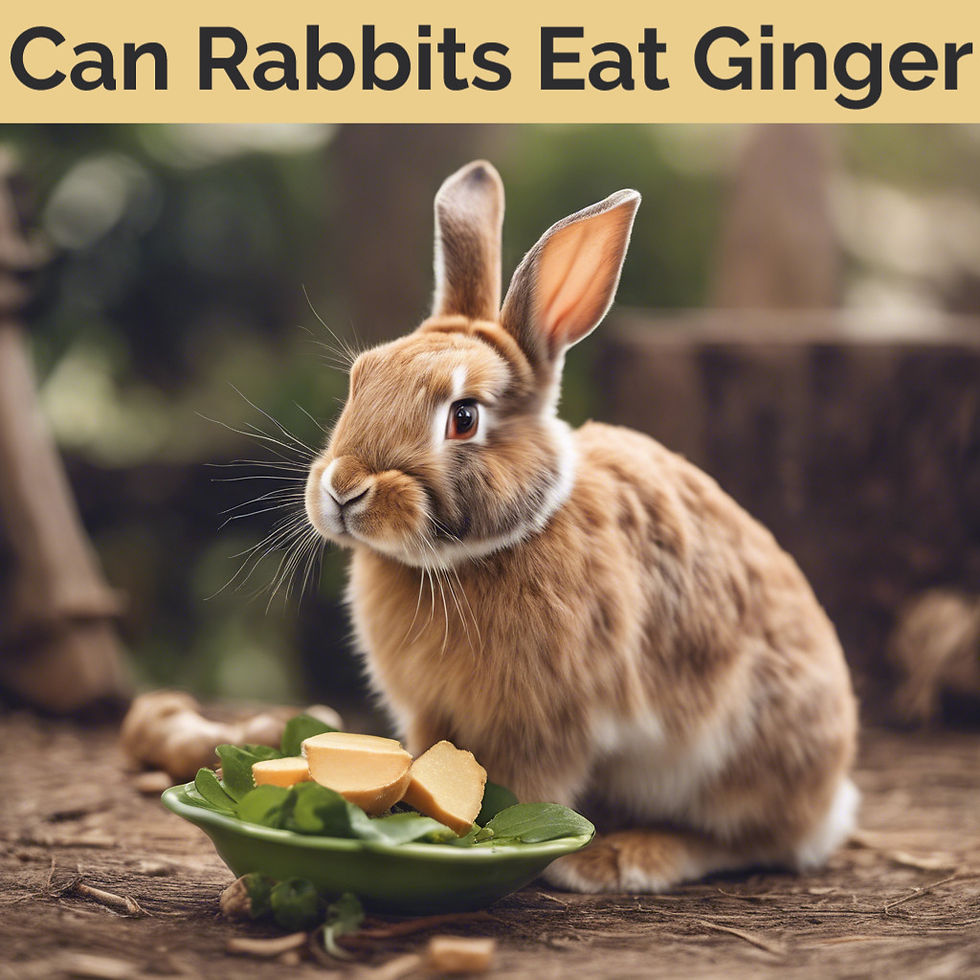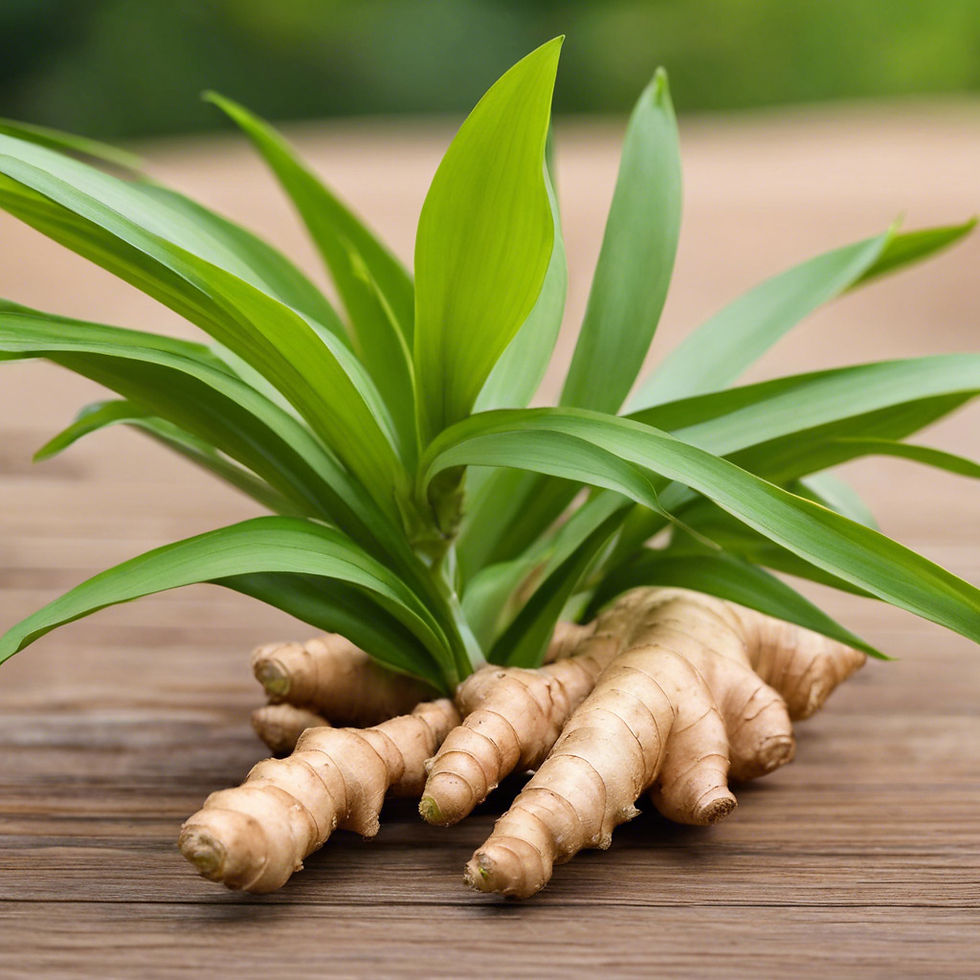When I first started caring for rabbits, I was fascinated by the variety of foods they could safely eat. From leafy greens to herbs, it was fun to see their little noses twitch with excitement over fresh vegetables. But every now and then, I’d stumble across a less common food and wonder, Can my rabbit eat this? That’s exactly what happened one afternoon when I was cooking with ginger. Its strong, zesty aroma filled the kitchen, and I noticed my bunny, Willow, curiously sniffing the air. This got me thinking: Is ginger safe for rabbits?

As it turns out, ginger is a bit of a gray area when it comes to rabbit diets. While it isn’t toxic to them, there are a few things to consider before sharing this spicy root with your furry friend. In this article, we’ll explore whether rabbits can eat ginger, the potential benefits and risks, and the best practices for feeding it to your bunny—if at all.
What Is Ginger?
Ginger is a root spice that has been used in cooking and traditional medicine for centuries. Known for its distinctive flavor and health benefits, ginger is commonly added to teas, stir-fries, and baked goods. But while it has many uses for humans, it’s not a typical food for rabbits.
The root is packed with bioactive compounds like gingerol, which is responsible for its strong taste and anti-inflammatory properties. However, this potent flavor can be overwhelming for a rabbit’s delicate palate, which is why ginger isn’t a common addition to their diet.
Can Rabbits Eat Ginger?
The short answer is yes, but with caution. Ginger is not toxic to rabbits, so a small nibble won’t harm them. However, it’s not an ideal food to include in their regular diet due to its strong flavor and potential effects on their sensitive digestive system.
Why Ginger Isn’t Ideal for Rabbits
Strong Flavor: Rabbits are naturally drawn to mild, grassy foods like hay and leafy greens. The spicy, zesty taste of ginger might not appeal to them and could even upset their stomach.
Low Fiber Content: Unlike hay, which is the cornerstone of a rabbit’s diet, ginger lacks the fiber rabbits need for proper digestion.
High Potency: Ginger contains compounds that are strong enough to irritate a rabbit’s mouth or stomach if consumed in large quantities.
Nutritional Benefits of Ginger
While ginger isn’t a necessary or highly beneficial food for rabbits, it does have some potential health perks when given in very small amounts:
Anti-Inflammatory Properties: Ginger contains gingerol, which has anti-inflammatory effects. In humans, this can help with digestion and reduce nausea, and it may have similar mild benefits for rabbits in very limited doses.
Antioxidants: Ginger is rich in antioxidants, which help combat free radicals and support overall health.
That said, these benefits are minor compared to the risks of overfeeding ginger. Rabbits get most of their nutrients from hay, fresh greens, and the occasional fruit or vegetable treat, so ginger isn’t necessary to keep them healthy.
Potential Risks of Feeding Ginger to Rabbits
When it comes to feeding ginger, the risks often outweigh the benefits, especially if it’s not introduced carefully or given in moderation. Here are the key concerns:

1. Digestive Upset
Rabbits have sensitive stomachs that are designed to process fibrous foods like hay. Ginger’s strong compounds can cause digestive issues, including gas, bloating, or diarrhea, especially if consumed in large amounts.
2. Oral Irritation
The spicy, pungent nature of ginger might irritate your rabbit’s mouth or tongue. This could make them reluctant to eat or cause discomfort.
3. Overfeeding Risk
Because ginger is not a natural part of a rabbit’s diet, overfeeding it can lead to imbalances in their gut bacteria. This is especially dangerous because a rabbit’s digestive system relies heavily on a balanced microbiome.
How to Safely Introduce Ginger to Your Rabbit
If you’re curious about whether your rabbit might enjoy ginger—or if you’re hoping to offer a tiny piece as a rare treat—here are some guidelines to follow:
1. Start Small
Offer your rabbit a piece of ginger no larger than the size of a pea. Monitor their reaction carefully to ensure they don’t experience any negative effects.
2. Observe for Allergic Reactions
After introducing ginger, keep an eye on your rabbit for signs of discomfort, such as:
Refusal to eat
Loose stools or diarrhea
Lethargy
If you notice any of these symptoms, stop feeding ginger immediately and consult your veterinarian.
3. Limit Frequency
Even if your rabbit seems to enjoy ginger, it should only be given as an occasional treat—no more than once a week.
4. Avoid Processed Ginger Products
Never offer your rabbit ginger in processed forms, such as ginger candy, pickled ginger, or ginger tea. These often contain added sugars, spices, or preservatives that can harm your rabbit.
What Happened When I Tried Feeding Ginger to My Rabbit?
Curiosity got the better of me, so I decided to offer Willow a tiny piece of fresh ginger to see her reaction. As soon as I placed it near her, she sniffed it cautiously, then backed away with a twitch of her nose.
It was clear that the pungent aroma wasn’t her favorite.
Still, I left the small piece in her play area to see if she’d return to it later. After a few tentative nibbles, she lost interest entirely and hopped off to chew on her hay instead. This confirmed what I’d suspected: while ginger isn’t harmful in small amounts, it’s not exactly appealing to most rabbits.
Alternatives to Ginger
If you’re looking for healthy treats to spice up your rabbit’s diet (without the literal spice!), here are some safer alternatives:
Fresh Herbs: Parsley, cilantro, and basil are flavorful yet mild enough for rabbits to enjoy.
Leafy Greens: Romaine lettuce, kale, and dandelion greens are nutrient-rich and rabbit-approved.
Root Vegetables: Carrot tops or small pieces of radish greens are safer options than ginger.
FAQs About Can Rabbits Eat Ginger?
1. Can rabbits eat ginger in any form?
Technically, rabbits can eat a small piece of fresh ginger, but it’s not a recommended food for them. Ginger isn’t toxic, but its strong, spicy flavor and lack of fiber make it unsuitable for a rabbit’s sensitive digestive system.
Processed forms of ginger, such as candied ginger, pickled ginger, or ginger tea, are entirely off-limits because they often contain additives like sugar, salt, or preservatives that can harm your bunny.
When I offered my rabbit Willow a small piece of fresh ginger, she sniffed it cautiously and took a few nibbles before hopping away. It seemed she found the pungent aroma and taste unappealing. While it didn’t harm her, it’s clear that ginger isn’t a natural fit for a rabbit’s diet. Stick to safer alternatives like fresh herbs or leafy greens.
2. How much ginger is safe for a rabbit to eat?
If you’re determined to let your rabbit try ginger, keep the portion extremely small—no larger than a pea-sized piece. Rabbits have very delicate digestive systems, and even a tiny amount of a new food can cause upset if their body isn’t used to it.
Introduce ginger cautiously and observe your rabbit for any signs of discomfort or adverse reactions, such as diarrhea, reduced appetite, or lethargy.
If you notice anything unusual, stop offering ginger immediately and consult your veterinarian.
It’s also worth mentioning that ginger should only be offered as a rare treat, not a regular part of your rabbit’s diet. Rabbits thrive on hay, fresh greens, and limited pellets—ginger doesn’t contribute much to their overall nutrition.
3. Are there any health benefits of ginger for rabbits?
Ginger does have some health benefits for humans, such as anti-inflammatory and antioxidant properties, but these effects are minimal and not well-documented in rabbits. While ginger contains compounds like gingerol, which can reduce inflammation and aid digestion in humans, these benefits aren’t significant enough to make ginger a valuable addition to your rabbit’s diet.
Rabbits get all the nutrients they need from a balanced diet of hay, greens, and pellets. For example, fresh herbs like parsley or cilantro provide both flavor and essential vitamins without the risks associated with ginger.
If your rabbit is experiencing digestive issues or other health problems, it’s always best to consult a veterinarian rather than experimenting with unconventional foods like ginger.
4. What should I do if my rabbit eats too much ginger?
If your rabbit accidentally eats a larger amount of ginger than intended, monitor them closely for any signs of distress. Symptoms to watch for include:
Diarrhea or soft stools: Ginger can irritate a rabbit’s digestive system.
Loss of appetite: If they stop eating their hay or favorite greens, this could indicate a problem.
Lethargy: A lack of energy or unusual behavior might signal discomfort.
If any of these symptoms occur, contact your rabbit-savvy veterinarian as soon as possible. They may recommend supportive care, such as providing plenty of fresh hay and water to encourage healthy digestion.
One time, my friend’s rabbit managed to sneak a piece of ginger that had fallen on the floor during cooking. While the bunny was fine after a day of careful observation, it was a good reminder to keep strong-smelling or unfamiliar foods out of reach of curious rabbits.
5. Are ginger leaves or ginger plants safe for rabbits?
The leaves of the ginger plant are generally not toxic to rabbits, but like the root, they’re not a particularly healthy choice either. Ginger leaves don’t offer much nutritional value, and their fibrous texture might be difficult for rabbits to chew and digest.
If you’re considering giving your rabbit ginger leaves, opt for safer and more beneficial greens instead, such as kale, dandelion greens, or romaine lettuce. These options provide essential nutrients and fiber without the potential risks associated with ginger.
6. What are better alternatives to ginger as a treat for rabbits?
If you’re looking for healthy, flavorful treats to offer your rabbit, there are plenty of options that are both safe and enjoyable for them. Here are some alternatives:
Fresh Herbs: Rabbits love mild, fragrant herbs like parsley, cilantro, basil, and mint. These are flavorful and packed with nutrients.
Leafy Greens: Romaine lettuce, kale, and carrot tops are excellent choices. Just remember to introduce new greens gradually to avoid upsetting their stomach.
Safe Vegetables: Small pieces of bell peppers, zucchini, or cucumber make great treats.
Rabbit-Safe Fruits: For an occasional sweet treat, offer a small slice of apple, banana, or strawberry. These should be given sparingly due to their sugar content.
When I stopped experimenting with foods like ginger and stuck to rabbit-safe options, Willow was much happier. She always looked forward to her treat time, especially when I offered her a sprig of parsley or a slice of cucumber. Watching her excitement over these healthy options reminded me that sticking to the basics is often the best approach.
Final Thoughts
So, can rabbits eat ginger? Technically, yes, but it’s not the best choice. While ginger isn’t toxic, its strong flavor, low fiber content, and potential to upset a rabbit’s sensitive stomach make it a less-than-ideal treat.
If you’re curious, you can offer a tiny piece occasionally, but don’t expect it to become your bunny’s new favorite snack.
For me, the experiment with Willow was a reminder that rabbits thrive on simple, natural foods like hay and leafy greens.
There’s no need to stray too far from their dietary staples to keep them healthy and happy. So the next time you’re cooking with ginger and see your bunny’s curious nose twitching, rest assured that a piece of parsley or cilantro will bring them far more joy. 🐰
Kommentare